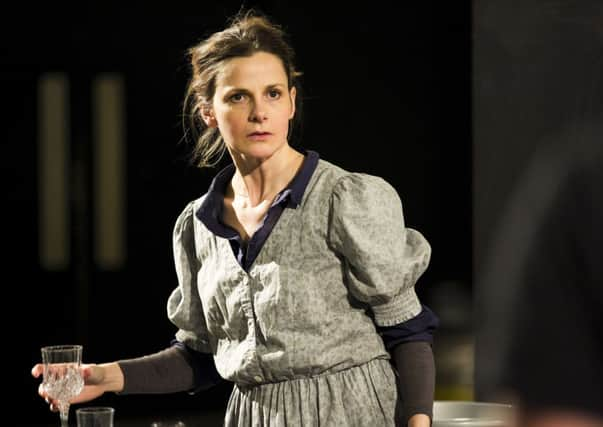Theatre review: Miss Julie, Glasgow


Miss Julie - Citizens’ Theatre, Glasgow
* * * *
Yet Dominic Hill’s brilliantly tense and fast-moving Citizens’ production of Zinnie Harris’s 2005 version of the play, set in 1920s Scotland, makes a fine effort at creating an alternative Miss Julie for our times; and it draws thrilling performances from Louise Brealey of Sherlock as Julie, Keith Fleming as the serving-man, John, and Jessica Hardwick as his long-suffering fianceé, Christine.
Neil Haynes’s set conjures up the bleak, almost institutional-looking kitchen of a no-frills Scottish country house at the time of the 1926 General Strike, an iconic moment of class conflict in Britain. Brealey’s Miss Julie – determined to celebrate midsummer’s night with the estate workers, regardless of convention – is a nervy, fragile and glamorous child of privilege, toying dangerously with people and ideas that she and her father would slap down without mercy if they ever acquired any real power.
Advertisement
Hide AdChristine, the cook – played with exceptional force and presence by Jessica Hardwick – is her polar opposite, a sensible, down-to-earth woman who thinks revolution a waste of time, and survives thanks to a solid sense of her own worth.
And between them stands John, brilliantly played by Keith Fleming as a complex man torn between his own working-class roots, and that classic combination of fierce personal ambition and helpless lust for a daughter of the landed class, that has led able working-class men throughout British history to abandon and betray their own people.
In the end – after John and Julie’s reckless night of love – the production begins to tilt into something more like comic melodrama than pure tragedy. It’s as if Brealey develops such an ironic distance from the behaviour of the rich wild-child she plays that she cannot quite give her tragic ending its full weight.
By that time, though, Dominic Hill and his fine cast have us completely hooked, utterly absorbed in the momentum of the drama. And if the setting lies almost 90 years in the past, there’s still something about the politics – of both class and gender – that seems eerily, almost sickeningly, familiar.
Seen on 7.2.14